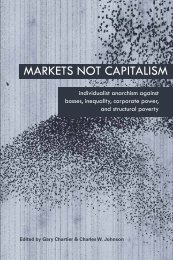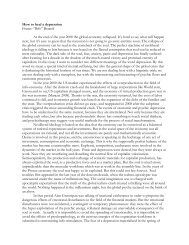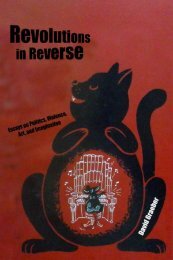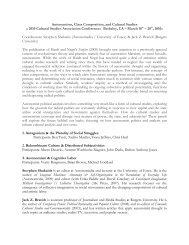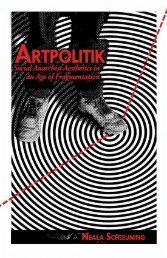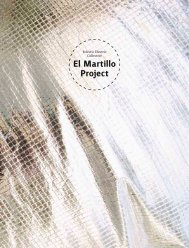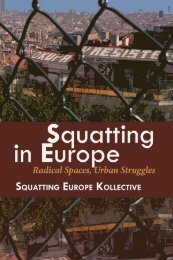nanopolitics handbook - Minor Compositions
nanopolitics handbook - Minor Compositions
nanopolitics handbook - Minor Compositions
You also want an ePaper? Increase the reach of your titles
YUMPU automatically turns print PDFs into web optimized ePapers that Google loves.
Rather than a vocabulary of politics within (and against) a ‘social body’ weget one which affirms the difference of forces, and which thinks in terms ofthe real opposition, resistance or composition between them, rather than, ina dialectical fashion, their ‘contradictory unity’.Today, under conditions of socio-economic meltdown such immediatestruggles of social and singular bodies defending their ability to reproduceand invent themselves are on the rise. This is the case when people in Spainand the US set up networks to resist evictions and to reoccupy or squat emptybuildings (claiming the spaces for bodies to inhabit together), or when Greeksrefuse to pay the austerity taxes levied over their electricity meters, and whenthey autoreduce their bills and refuse to pay bus fares (taking the energy andmovement necessary for their bodies). These struggles are immediate not inthe sense of being purely localistic or presentist, but in the sense of not lettingtheoretical knowledge of social mediation (whether that of friend or enemies)postpone action or displace it to elsewhere. And they are immediate innot letting mediators direct the energies (anger, desire, etc.) away from theirimmediate aims. 9 Immediate struggles are struggles where one often cannotchoose not to fight: either because one is under attack, or because of an existential-desiringnecessity: it is when you do not make the choice, but thechoice makes you.However, when we fight the mechanisms of capital and the state ‘immediately’,we are still fighting mediations, and our resistances and struggles arereplies to powers that are not by any means merely situational. As Isaak Rubinonce noted, capitalism is ‘a thick network of indirect production relations’. 10If the central form of power under capitalism is money, it is one that is difficultto block, but easy to reroute around sites of resistance (this is a functionof money being ‘between’ the state and capital: between market flows andcalculated class politics, for instance in the messy process of competitive deregulationof banking and finance during the last decades of ‘neoliberal’ globalisation).This re-routing is often – given our dependency on money – thestrongest form of power itself: no weapons or siege is needed for those thatcan induce a lack by the click of a button (reject a loan application, raise thecost of borrowing, invest where workers are not unionised, etc.). McKenzieWark asks: ‘how to occupy an abstraction’? 11 The local measures taken againstour bodies and to govern our individuation, are results of the flows of moneyand debt on a global scale, real as well as imaginary. Especially in our currentcrisis our immediate struggles are directly bound up with the abstractworld of the globalised financial system. In this situation it becomes urgent tosearch for vocabularies and theoretical tools for the analysis of what it meansto struggle both ‘immediately’ and ‘mediately’ within, against, and beyond202



